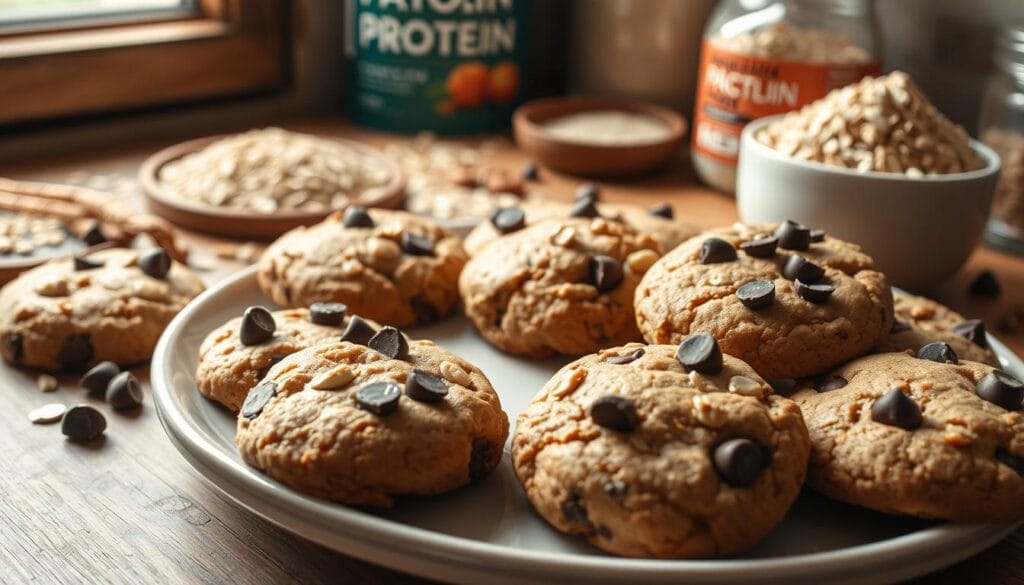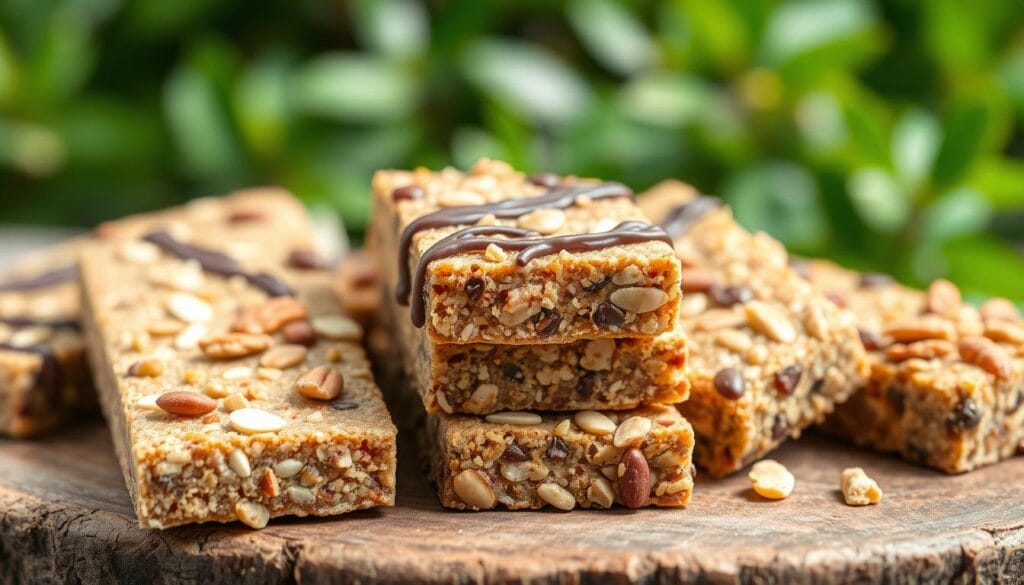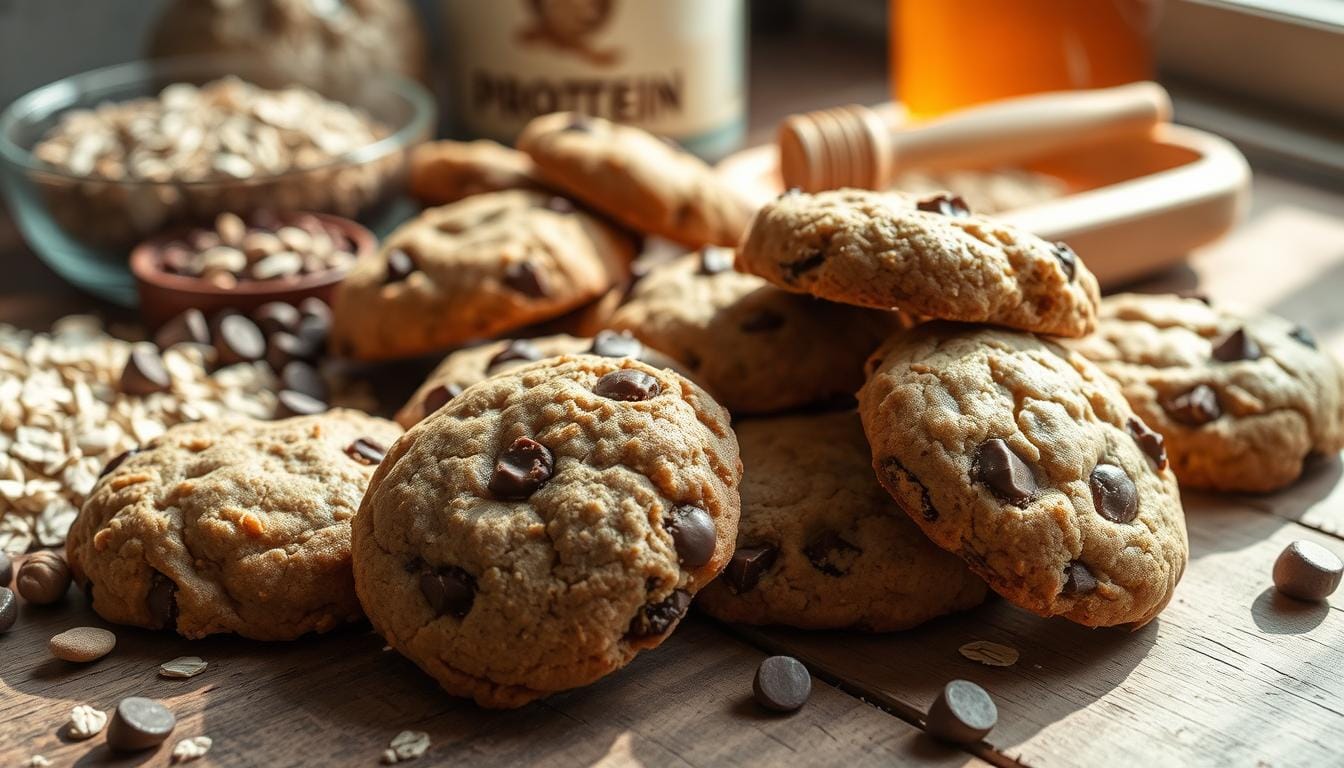Protein Cookies: Healthy Snacks for Your Fitness Goals
As someone who cares about health, finding snacks that are both tasty and fit my fitness goals was hard. That changed when I found protein cookies. These tasty treats are now a key part of my diet, helping me power through workouts and satisfy my sweet tooth.
Picture biting into a soft, chewy cookie that’s full of protein, fiber, and natural sweetness. That’s what homemade protein cookies offer. They mix the joy of a classic cookie with the health benefits of a protein-rich snack. They’re great for anyone who loves to work out or just wants a healthier snack option.
Table of Contents
Main Ingredients
Core Protein Sources
- ½ cup vanilla protein powder (whey, pea, or plant-based)
- 1 cup creamy peanut butter (or almond/cashew butter)
Natural Sweeteners & Binders
- ⅔ cup coconut sugar (or maple syrup/honey)
- 2 large eggs (or flax eggs for vegan options)
Add-ins & Enhancements
- ¼ cup flaxseed meal
- 2 tbsp chia seeds
- ¼ cup dark chocolate chips (optional)
Preparation Steps in Detail
- Preheat oven to 350°F (177°C). Line a baking sheet with parchment paper.
- Mix wet ingredients: In a bowl, combine 1 cup creamy peanut butter, 2 large eggs, and ⅔ cup coconut sugar.
- Add dry ingredients: Stir in ½ cup vanilla protein powder, ¼ cup flaxseed meal, and 2 tbsp chia seeds. Fold in ¼ cup dark chocolate chips (if using).
- Scoop dough: Roll into 18 balls and flatten slightly on the baking sheet.
- Bake 10–12 minutes until edges turn golden. Cool completely before serving.


Tips for Success
- For fitness treats with extra crunch, add ¼ cup crushed walnuts to the dough.
- Swap ½ cup vanilla protein powder for chocolate flavor to create decadent nutritious baked goods.
- Use ⅓ cup mashed banana instead of eggs for binding if avoiding dairy.
Common Problems and Solutions
Problem: Cookies crumble easily.
Solution: Add 1-2 tbsp almond milk to moisten dry dough.
Problem: Bitter aftertaste.
Solution: Use 2-3 tbsp honey instead of coconut sugar for sweetness.
Problem: Flat cookies.
Solution: Chill dough for 30 minutes before baking.
Innovative Garnishing Ideas
- Drizzle 2 tbsp melted dark chocolate over cooled cookies.
- Press 1 tsp sea salt flakes into dough before baking for a gourmet touch.
- Top with 1 tbsp shredded coconut for tropical macro-friendly desserts.
Storage and Reheating Information
- Room temperature: Store in an airtight container for 3 days.
- Freezer: Wrap individually and freeze for 2 months.
- Reheat: Microwave for 10 seconds or bake at 300°F (150°C) for 3 minutes.


Nutrition (Per Serving)
1 cookie (1/18th of recipe):
- Sugar: 5g
- Calories: 120
- Protein: 8g
- Carbs: 10g
- Fiber: 3g
Conclusion
Protein cookies are a tasty and healthy snack that helps with fitness goals. They are great for building muscle and managing weight. These cookies satisfy your sweet tooth while giving you important nutrients for recovery and energy.
By making them at home, you can pick the ingredients and flavors you like. This way, they fit perfectly with your diet needs.
Protein cookies are perfect as a post-workout snack or a healthier dessert. They have a lot of plant-based protein, which is good for muscle repair and growth. They also have chia seeds, quinoa, and almond flour, adding fiber, vitamins, and minerals.
These cookies are easy to take with you because they come in individual packs. You can enjoy them anywhere, anytime. With flavors like chocolate chip, matcha, and pumpkin spice, there’s something for everyone. Adding protein cookies to your diet can help you feel full longer and eat less.
FAQ
- What are the key ingredients in homemade protein cookies?
- Homemade protein cookies have protein powder, nut butters, and flours like almond or coconut. They also have natural sweeteners like honey or maple syrup. Eggs, applesauce, or mashed bananas help bind the ingredients. You can add chocolate chips, nuts, or seeds for extra flavor.
- What are the nutritional benefits of homemade protein cookies?
- These cookies have 7-14 grams of protein and are rich in fiber and healthy fats. They have fewer calories than regular cookies, around 100-150 per cookie. Using natural sweeteners and wholesome ingredients makes them nutritious.
- How do homemade protein cookies differ from store-bought options?
- Homemade cookies let you choose healthier ingredients and fit dietary needs. They’re cheaper, customizable, and taste better than store-bought ones. You know exactly what’s in them.
- When is the best time to consume protein cookies?
- Eat them after working out, within 30-60 minutes. This helps with muscle recovery and replenishes glycogen.
- How can protein cookies be customized for different dietary needs?
- You can make them gluten-free, vegan, low-carb, dairy-free, or nut-free. Use the right protein powders, flours, and egg substitutes for each need.
- What are some common mistakes to avoid when making protein cookies?
- Avoid overmixing, overbaking, and using too much protein powder. Adjust liquids for different powders. Balance flavors and texture well.
- Can protein cookies be made for specific fitness goals?
- Yes, you can make them for different goals. Low-carb ones use almond or coconut flour. High-protein ones mix proteins. Endurance cookies have complex carbs and proteins.
Have You Tried Our Recipe?
There are no reviews yet. Be the first one to write one.

